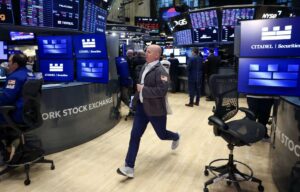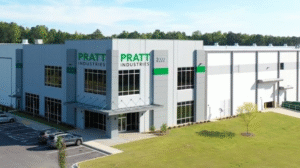U.S. Growth at Stake? Pfizer CEO Sounds Alarm Over Tariffs Blocking Billions in Investments—this powerful statement reflects growing concern among U.S. pharma leaders over proposed tariffs that could threaten innovation, increase drug costs, and drive investments away from America.
Pfizer CEO’s Statement: What Did He Really Say?
Albert Bourla, CEO of Pfizer, publicly stated that the uncertainty surrounding the U.S. government’s proposed pharmaceutical tariffs is directly preventing billions of dollars in domestic investments. According to Bourla, Pfizer is ready to make “tremendous investments” in U.S.-based manufacturing and research—but only if the policy environment becomes more stable.
This announcement sends a clear warning: If the U.S. imposes broad tariffs on pharmaceutical imports, it may lose out on vital economic growth and medical advancement.
Why Are These Tariffs Being Proposed?
The Biden and Trump administrations have both expressed a desire to rebuild domestic supply chains. Tariffs on foreign-made drugs and ingredients are being discussed to push pharmaceutical companies to manufacture within the U.S.
However, multiple industry studies warn that these tariffs may:
- Significantly increase drug prices
- Disrupt global supply chains
- Delay patient access to critical medications
A report by Ernst & Young estimates that a 25% tariff on pharmaceutical imports could raise U.S. healthcare costs by $51 billion annually.
Tariffs vs. Pharma Investment — A Quick Comparison
| Factor | With Tariffs | Without Tariffs |
|---|---|---|
| Drug Prices | Likely to increase up to $51B annually | More stable, globally competitive |
| Investment in U.S. Facilities | Stalled or redirected abroad | Higher domestic investment |
| Innovation Timeline | Delayed by 18–24 months | Faster R&D and market entry |
| Job Creation | At risk due to cost pressures | Increased with new U.S.-based projects |
| Supply Chain | Disrupted due to import barriers | Efficient with international collaboration |
This shows how protective tariffs may backfire, undermining both economic and health priorities.
What Is Pfizer Doing About It?
Pfizer already operates 13 major U.S. manufacturing sites, and the CEO made it clear that more domestic investment could happen—but not under financial pressure from government policies.
So far, Pfizer has:
- Budgeted $150 million in tariff-related costs for 2025
- Developed contingency plans for shifting global production
- Launched a $7.7 billion cost-saving initiative using automation and AI
- Pledged to grow U.S. operations only if tariff threats are lifted
This reflects a conditional strategy: if the environment is right, Pfizer wants to grow in the U.S.—but current tariff policies make that uncertain.
How Tariffs Could Disrupt the Entire Industry
Pfizer is not alone. Companies like Johnson & Johnson, Merck, and Amgen also rely on international suppliers for raw materials, APIs, and clinical trials. Broad-based tariffs could:
- Increase manufacturing costs across the board
- Delay FDA approvals due to supply chain delays
- Encourage relocation of R&D to more policy-friendly countries
According to Brookings Institution analysts, these supply chain disruptions could slow new drug development in the U.S. by nearly two years in some cases.
Real Data: How Much Could Drug Prices Rise?
According to Ernst & Young:
- A 25% tariff on imported pharmaceutical products
- Would result in $51 billion/year in additional healthcare costs
- Affect nearly 65% of the U.S. pharmaceutical supply chain
These costs are not absorbed by corporations—they are passed on to American consumers, insurers, and the government’s Medicare and Medicaid programs.
What Needs to Change for U.S. Pharma to Grow?
To foster pharmaceutical investment in the U.S., companies like Pfizer are calling for:
- Policy clarity on long-term tariff plans
- Government incentives for local production
- Streamlined regulatory approvals for domestic expansions
The current lack of clarity creates risk, and risk discourages long-term investment. Without assurance that tariffs won’t damage profitability, companies hesitate to expand operations.
The Ripple Effects of Pharma Tariffs
Pharma Tariffs
|
-----------------------------------------
| | |
Rising Drug Investment Delay Supply Chain Shock
Prices in U.S. Globally
| | |
Impact on Job Creation Falls Longer Drug Approval
ConsumersThis visualization shows how a single policy—tariffs—can cause widespread disruption across the entire pharmaceutical ecosystem.
Final Thoughts: Will America Risk Its Pharma Future?
The statement from Pfizer’s CEO should be taken as a strategic warning, not a threat. If the U.S. wants to stay ahead in global health innovation, it must support open, investment-friendly policies—not close its doors with tariffs.
The cost of these policies could be more than just dollars. They could mean lost innovation, fewer treatments, and a slower path to critical medical breakthroughs.
Now is the time for policymakers to strike a balanced approach: encourage domestic growth without punishing the very companies America depends on for its health future.
[USnewsSphere.com / reu.]





